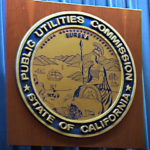Back in the day, long ago in 2010 when the modern phase of electric cars hadn’t started being sold to the public, General Motors was showing the Chevy Volt at some public events. One of those was at the Presidio of San Francisco (in a couple hundred years, due to be Star Fleet’s Headquarters) for a public showing. As a budding member of the press I was able to attend, take a test drive, talk to some people including GM’s marketing representatives, and then write a news article or two.
At that time I had noted two approaches to selling electric cars: Coda Automotive was putting signs which looked like tombstones (or historical markers) on gasoline pumps, implying that the age of gasoline was rapidly coming to an end. Fisker Automotive instead was draping scantily clad women over their cars, obviously appealing to the sex factor of the Fisker Karma. General Motors, on the other hand, was telling us the on-board generator “eliminates the worry of being stranded by a depleted battery” obviously hoping to exploit everyone’s range anxiety fear to sell more Chevy Volt’s![]() .
.
That is – the gasoline engine was touted by GM as the solution to range anxiety. What’s actually happened is that Volt owners have Gasoline Anxiety, or the dread of the gas engine kicking on.
What I didn’t know at the time is that GM had trademark’d the phrase “Range Anxiety.”
 |
| Source: tmsearch.uspto.gov |
It was a nice bit of insight by myself and other writers covering the scene to point out how GM was exploiting range anxiety fears to sell the Volt. It’s quite another thing entirely to learn that GM actually trademark’d the phrase.
You can verify it for yourself by heading to http://tmsearch.uspto.gov/![]() then clicking on the “Basic Word Mark Search” link, then entering “range anxiety” as a search term.
then clicking on the “Basic Word Mark Search” link, then entering “range anxiety” as a search term.
What comes up is the results screen shown here.
On July 6, 2010, GM filed for the trademark and the USPTO published the application in October. By January 2011, however, they’d abandoned the trademark. Perhaps someone wised up and realized it wasn’t a good idea to have ownership over that phrase.
Today, the same thread of marketing message is still there but very subtle. Look at the main Volt sales page![]() , and sprinkled all through the page is the idea that long-range driving means using gasoline. That’s through phrases like “when the battery runs low, the generator kicks in” to extend the vehicle range.
, and sprinkled all through the page is the idea that long-range driving means using gasoline. That’s through phrases like “when the battery runs low, the generator kicks in” to extend the vehicle range.
Of course they say this because gasoline range extension is the Volt’s key selling point. At the same time, the Volt’s design represents an opinion that range anxiety is best solved with gasoline.
I’ve written a page going over what I think is the best solution to range anxiety – developing range confidence![]() .
.
- Highway design could decrease death and injury risk, if “we” chose smarter designs - March 28, 2015
- GM really did trademark “range anxiety”, only later to abandon that mark - March 25, 2015
- US Government releases new regulations on hydraulic fracturing, that some call “toothless” - March 20, 2015
- Tesla Motors magic pill to solve range anxiety doesn’t quite instill range confidence - March 19, 2015
- Update on Galena IL oil train – 21 cars involved, which were the supposedly safer CP1232 design - March 7, 2015
- Another oil bomb train – why are they shipping crude oil by train? – Symptoms of fossil fuel addiction - March 6, 2015
- Chevron relinquishes fracking in Romania, as part of broader pull-out from Eastern European fracking operations - February 22, 2015
- Answer anti- electric car articles with truth and pride – truth outshines all distortions - February 19, 2015
- Apple taking big risk on developing a car? Please, Apple, don’t go there! - February 16, 2015
- Toyota, Nissan, Honda working on Japanese fuel cell infrastructure for Japanese government - February 12, 2015























Pingback: GM turns over Bolt design work to LG Corp while dissing BEV’s in new advert | The Long Tail Pipe
Pingback: GM’s “range extended EV” fallacy — fast charging is also a range extender | The Long Tail Pipe